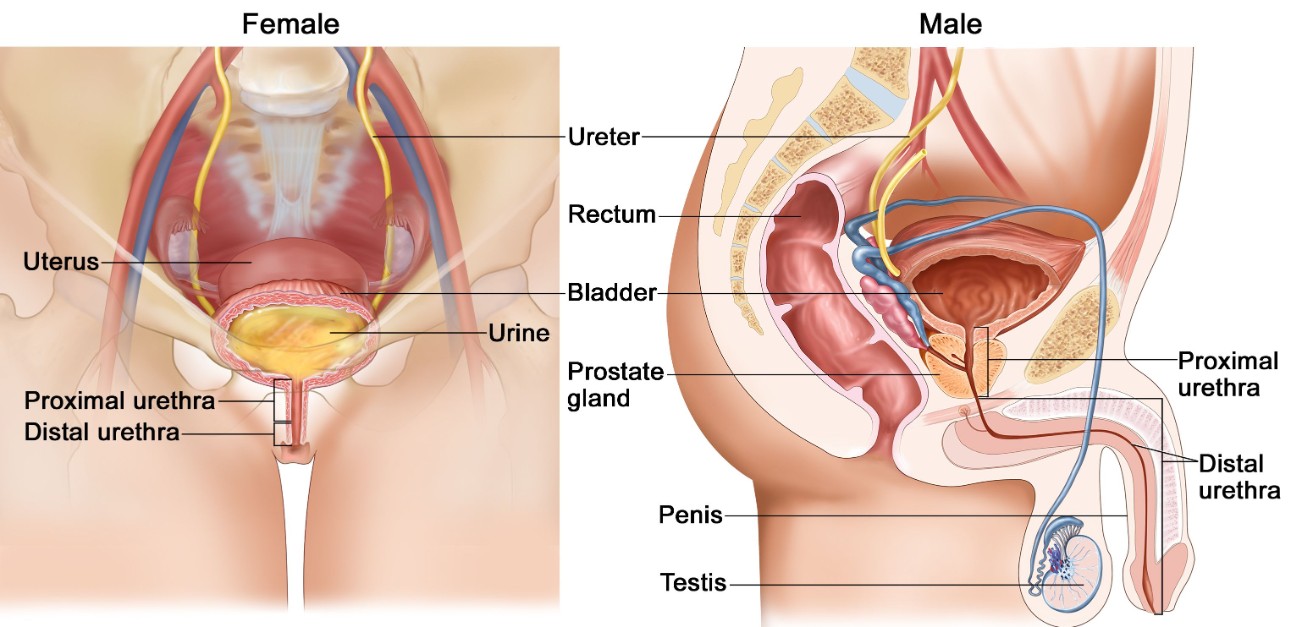
Urethral cancer is a rare form of cancer that occurs in the urethra, the tube that carries urine from the bladder to the outside of the body. It can develop in any part of the urethra, including the proximal (near the bladder) and distal (near the external opening) parts. While urethral cancer is considered an uncommon cancer, it is an important condition to understand due to its symptoms, diagnosis, and treatment options that may differ from more common cancers of the urinary system.
Urethral cancer is most commonly diagnosed in individuals over the age of 60 and is more prevalent in women than in men. It accounts for less than 1% of all urinary tract cancers, which include cancers of the kidneys, bladder, and ureters. There are several subtypes of urethral cancer, including squamous cell carcinoma, transitional cell carcinoma, and adenocarcinoma, each with distinct characteristics and treatment strategies.
Due to its rarity and the fact that many of its symptoms overlap with those of other, more common urinary tract conditions, urethral cancer is often diagnosed late, which can affect the prognosis. Early detection is crucial, as treatment options are more effective in the early stages of the disease.
The exact cause of urethral cancer remains unclear, but certain risk factors have been identified that increase the likelihood of developing this rare cancer. Understanding these factors is important in both prevention and early detection.
-
Gender: Urethral cancer is more commonly diagnosed in women than in men. This may be because the female urethra is shorter, making it more prone to injury or irritation, which can lead to cancer development. Additionally, women are more likely to have a history of urinary tract infections (UTIs) and other conditions that may increase the risk of urethral cancer.
-
Age: Urethral cancer is most often diagnosed in individuals over the age of 60. As with many types of cancer, the risk increases with age due to the accumulation of genetic mutations and prolonged exposure to environmental and lifestyle factors.
-
Chronic Urinary Tract Infections (UTIs): Recurrent or chronic UTIs can increase the risk of urethral cancer. The inflammation and irritation caused by frequent infections can damage the cells of the urethra, potentially leading to cancerous changes over time.
-
Urethral Stricture: Urethral stricture refers to the narrowing of the urethra, which can result from scarring or injury. It has been associated with an increased risk of developing urethral cancer, as the irritation and inflammation caused by strictures may encourage cancerous cell growth.
-
Sexually Transmitted Infections (STIs): Infections such as human papillomavirus (HPV), which is known to be linked to various cancers, including cervical and penile cancers, may also play a role in the development of urethral cancer, especially in those with a history of high-risk sexual activity.
-
Previous Cancer Treatments: Individuals who have undergone radiation therapy or chemotherapy, especially for cancers of the pelvic region, are at a higher risk of developing urethral cancer. These treatments can damage the urethral tissues and increase the risk of developing secondary cancers.
-
Smoking: Smoking has been shown to increase the risk of various cancers, including urethral cancer. Chemicals in tobacco can damage the tissues of the urinary tract, leading to cancer development over time.
-
Genetic Factors: While there is no specific genetic mutation associated with urethral cancer, individuals with certain inherited cancer syndromes, such as Lynch syndrome, may be at increased risk for developing cancers of the urinary tract, including urethral cancer.
Though these risk factors increase the likelihood of urethral cancer, many individuals diagnosed with the disease may not have any known risk factors. Conversely, those with multiple risk factors may not necessarily develop cancer, highlighting the complexity of cancer development.
The symptoms of urethral cancer can vary depending on the tumor’s size, location, and stage of development. Many of these symptoms overlap with other urinary tract conditions, such as infections or benign enlargement, which can make diagnosis more challenging. Common symptoms include:
-
Blood in the Urine (Hematuria): One of the most common symptoms of urethral cancer is the presence of blood in the urine, which may be visible to the naked eye (gross hematuria) or detected under a microscope (microscopic hematuria). Hematuria is a warning sign and should be promptly evaluated by a healthcare provider.
-
Painful Urination (Dysuria): Individuals with urethral cancer may experience pain or a burning sensation while urinating. This is particularly common in cases where the tumor is near the external opening of the urethra or is obstructing the flow of urine.
-
Frequent Urination: Some patients with urethral cancer may experience a frequent need to urinate, even when the bladder is not full. This can be a result of the cancer irritating the bladder or blocking the normal flow of urine.
-
Pelvic Pain: Pain in the pelvic region or lower abdomen is common as the tumor grows and presses against surrounding tissues. The pain may be dull or sharp and may worsen with physical activity or during urination.
-
Swelling of the Urethra or Genital Area: A visible lump or swelling in the urethra or genital area may occur if the tumor has grown large enough to affect the surrounding tissues.
-
Narrowing of the Urethra (Urethral Stricture): As the cancer grows, it may cause the urethra to narrow, making it more difficult to pass urine. This can lead to a feeling of incomplete bladder emptying or difficulty starting the urine stream.
-
Incontinence: In more advanced stages of urethral cancer, patients may experience incontinence, which is the involuntary leakage of urine. This may be caused by the tumor obstructing the flow of urine or affecting the muscles responsible for bladder control.
-
Fatigue and Weight Loss: Unexplained weight loss, particularly when accompanied by fatigue or lack of appetite, may indicate that the cancer has progressed to a more advanced stage.
As with many cancers, these symptoms are not unique to urethral cancer and may be caused by other conditions, such as infections, benign tumors, or urinary tract stones. However, if symptoms persist, it is important to seek medical attention for further investigation.
The diagnosis of urethral cancer typically involves a combination of medical history review, physical examination, imaging studies, and biopsy. Due to the rarity of urethral cancer, a multidisciplinary team of specialists, including urologists and oncologists, may be involved in the diagnosis and treatment planning.
-
Physical Examination: The doctor will begin by performing a physical examination to assess the external genitalia and urethra for any lumps, swelling, or abnormalities. In women, the doctor may also conduct a pelvic exam to assess for any signs of cancer.
-
Urethroscopy: Urethroscopy involves inserting a thin tube with a camera (urethroscope) into the urethra to visually examine the lining of the urethra for any tumors or abnormal growths. This is a critical step in diagnosing urethral cancer and determining the location and extent of the tumor.
-
Cystoscopy: In some cases, a cystoscopy may be performed to examine the bladder and lower urinary tract more thoroughly. A cystoscope is inserted into the bladder through the urethra, allowing the doctor to inspect the bladder and urethra for abnormalities.
-
Imaging Tests:
-
CT Scan (Computed Tomography): A CT scan provides detailed images of the urinary system, including the kidneys, ureters, and bladder, helping to identify the size, location, and spread of the tumor.
-
MRI (Magnetic Resonance Imaging): MRI can provide more detailed images of soft tissues and is useful for assessing the extent of the tumor and its potential invasion into surrounding organs.
-
Ultrasound: An ultrasound may be used to detect masses in the pelvic region, helping to guide further diagnostic testing.
-
-
Biopsy: A biopsy involves removing a small sample of tissue from the tumor for examination under a microscope. This is the definitive method for diagnosing urethral cancer and determining its type (e.g., squamous cell carcinoma, transitional cell carcinoma).
-
Urine Cytology: In some cases, a urine cytology test may be conducted to look for abnormal cells in the urine that could indicate cancer.
-
Blood Tests: Blood tests may be used to assess overall health, kidney function, and to check for markers that may indicate the presence of cancer.
Treatment for urethral cancer depends on the type, stage, and location of the tumor, as well as the patient’s overall health. The primary treatment options include:
-
Surgery: Surgery is often the first line of treatment for urethral cancer. The goal is to remove the tumor and any affected tissue. Depending on the tumor’s size and location, this may involve:
-
Urethrectomy: Removal of part or all of the urethra. In some cases, nearby lymph nodes may also be removed to prevent the spread of cancer.
-
Cystectomy: In more advanced cases, the bladder may need to be removed if the cancer has spread to the bladder or surrounding structures.
-
-
Radiation Therapy: Radiation therapy uses high-energy rays to kill cancer cells. It is commonly used after surgery to kill remaining cancer cells or in cases where surgery is not possible. Radiation may also be used to shrink tumors before surgery to make the procedure less invasive.
-
Chemotherapy: Chemotherapy involves the use of drugs to destroy cancer cells. It is often used for advanced or metastatic urethral cancer, particularly if the cancer has spread to other parts of the body. Chemotherapy can be given as systemic treatment or used in combination with surgery or radiation.
-
Immunotherapy: Immunotherapy is an emerging treatment that enhances the body’s immune system to fight cancer. This approach is still being studied for urethral cancer but has shown promise for other urothelial cancers, such as bladder cancer.
-
Targeted Therapy: Targeted therapies focus on specific molecules that contribute to cancer cell growth. These therapies are being explored for use in advanced urethral cancer cases.
While urethral cancer cannot always be prevented, certain lifestyle changes and medical strategies can help reduce the risk and improve management:
-
Quit Smoking: Smoking is the most significant preventable risk factor for urethral cancer. Quitting smoking reduces the risk of developing this cancer and improves overall health.
-
Avoid Chemical Exposure: For individuals working with industrial chemicals, using proper protective equipment and following safety protocols can help reduce the risk of exposure to carcinogens.
-
Regular Screening: Individuals with a history of UTIs, urethral strictures, or radiation therapy should have regular check-ups with a healthcare provider to monitor for signs of cancer.
-
Hydration and Urinary Health: Staying well-hydrated and maintaining a healthy urinary tract through proper hygiene can help reduce the risk of infections and other conditions that may lead to cancer.
Treatment for urethral cancer can result in several complications:
-
Urinary Incontinence: Surgical treatment, such as urethrectomy or cystectomy, may lead to changes in urinary function, potentially causing incontinence or difficulty urinating.
-
Infection: Surgery, radiation, and chemotherapy can weaken the immune system, increasing the risk of infections in the urinary tract or other areas of the body.
-
Recurrence: Urethral cancer is prone to recurrence, especially if it is not completely removed during surgery. Regular follow-ups are essential for detecting and treating any recurrence early.
-
Psychosocial Impact: The emotional toll of a cancer diagnosis, especially one involving the urinary system, can be significant. Patients may experience anxiety, depression, or body image issues, requiring emotional support and counseling.
Life after treatment for urethral cancer requires ongoing care and support:
-
Physical Rehabilitation: After surgery or treatment, patients may need rehabilitation to regain urinary function or improve physical mobility.
-
Psychological Support: Cancer treatments can be emotionally and mentally exhausting. Psychological counseling, support groups, and therapy can help patients cope with the emotional challenges of the disease and its treatment.
-
Follow-Up Care: Regular follow-up visits, including imaging tests and physical exams, are essential for detecting any recurrence of cancer and managing long-term side effects of treatment.
-
Lifestyle Adjustments: Maintaining a healthy diet, exercising regularly, and avoiding smoking or excessive alcohol consumption are essential for overall well-being during recovery.
1. What is urethral cancer?
Urethral cancer is a rare type of cancer that originates in the urethra, the tube that carries urine from the bladder to the outside of the body. It can develop in both men and women, but it is more common in women. This cancer can affect the cells lining the urethra and may involve the urethral orifice, urethral walls, or surrounding tissues.
2. What are the causes of urethral cancer?
The exact cause of urethral cancer is not well understood. However, factors such as chronic irritation or inflammation of the urethra, certain sexually transmitted infections (e.g., human papillomavirus or HPV), a history of bladder cancer, and exposure to harmful chemicals or radiation may increase the risk of developing urethral cancer.
3. What are the symptoms of urethral cancer?
Symptoms of urethral cancer can vary depending on the tumor's location and stage. Common signs include:
-
Pain or burning during urination
-
Blood in the urine (hematuria)
-
Difficulty urinating or frequent urination
-
A palpable mass or swelling in the genital area
-
Pain or discomfort in the pelvic region
Some people may not experience symptoms until the cancer is more advanced.
4. How is urethral cancer diagnosed?
Diagnosis typically involves a combination of physical examination, imaging tests (such as ultrasound, CT scan, or MRI), and cystoscopy, which involves inserting a small camera into the urethra to view the area. A biopsy is often performed to confirm the diagnosis and determine the cancer type. Additional tests may be needed to assess the extent of cancer spread.
5. What are the stages of urethral cancer?
Urethral cancer is staged based on its size, location, and spread to nearby tissues or lymph nodes. The stages range from Stage I (early cancer confined to the urethra) to Stage IV (advanced cancer that has spread to other parts of the body). Staging helps guide treatment decisions and provides information about the prognosis.
6. What treatment options are available for urethral cancer?
Treatment options for urethral cancer may include:
-
Surgery to remove the tumor or affected part of the urethra.
-
Radiation therapy to target cancer cells and shrink tumors.
-
Chemotherapy to treat cancer that has spread beyond the urethra.
-
Immunotherapy or targeted therapy may be used in some cases, particularly for advanced or recurrent cancers.
The choice of treatment depends on the cancer’s stage, location, and the patient’s overall health.
7. Can urethral cancer be prevented?
There is no definitive way to prevent urethral cancer. However, avoiding risk factors such as smoking, limiting exposure to chemicals, practicing safe sex to reduce the risk of sexually transmitted infections, and staying up-to-date with regular medical check-ups can help reduce the likelihood of developing the condition.
8. What is the prognosis for people with urethral cancer?
The prognosis for urethral cancer depends on factors like the cancer’s stage at diagnosis, its location, and how well it responds to treatment. Early-stage urethral cancer has a higher chance of successful treatment and recovery, whereas advanced stages or cancers that have spread may have a less favorable prognosis. Regular follow-up care is important for monitoring recurrence.
9. What are the possible complications of urethral cancer?
Complications of urethral cancer can include:
-
Urinary obstruction: Tumors can block the urethra, making it difficult to urinate.
-
Infections: Surgery or radiation can increase the risk of urinary tract infections.
-
Recurrence: Urethral cancer can recur after treatment, requiring additional interventions.
-
Loss of urethral function: If extensive surgery is required, there may be challenges in maintaining normal urinary function.
10. How do patients cope with urethral cancer emotionally?
A cancer diagnosis can be emotionally challenging. Patients with urethral cancer may experience feelings of fear, anxiety, and depression. It is important for patients to seek emotional and psychological support through counseling, support groups, and the assistance of healthcare professionals who specialize in providing care to cancer patients. Family support is also crucial in helping patients cope with their diagnosis and treatment.
Thailand, Malaysia, Singapore, Turkey and India are the most cost effective locations that offer up to almost 80% savings in comparison to the US.
SurgeryPlanet facilitates a plethora of services to the medical treatment traveler also which includes, a hassle free and discounted travel option, a welcome hand at the airport on arrival, travel in an air-conditioned car, round the clock service & support. Your medical evaluation is pre arranged with the least of waiting time. Once your assessment is complete and found medically fit, the procedure is immediately scheduled without a waiting period. Please read through our Services and Testimonials to understand and select your best options.
Major Treatments Abroad: Obesity / Bariatric Surgery | Spine Surgery | Stem Cell therapy | Fertility treatment | Knee replacement in India and Thailand | Heart Surgery | Organ transplant | ../ayurveda Treatment | Heart valve replacement | Hip resurfacing | Hospitals in India and Thailand for Laparoscopic Sterilization| Best hospitals in Asia | JCI & ISO certified Hospitals | Cost effective medical procedures | Healthcare tourism | Complete privacy for affordable cost | Weight loss procedures | Infertility treatment | Board certified physicians | Low cost surgeries
SurgeryPlanet is an Healthcare Facilitator and not a Medical service provider. The information provided in this website is not to be used for diagnosis or treatment of any medical condition or use for any medical purposes. We provide information solely for medical travel facilitation and do not endorse any particular health care provider, hospital, facility, destination or any healthcare service or treatment listed. We are not an agent for, or affiliated to any health care provider, or service listed in our website and is not responsible for health care services provided by them. Choice of hospital or doctor for your healthcare services is your independent decision. Consult your domestic licensed health care provider before seeking the services of any health care provider you learn about from our website.



